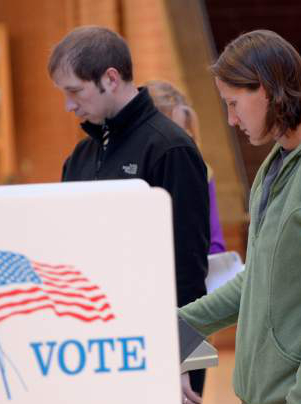This is an archived article that was published on sltrib.com in 2015, and information in the article may be outdated. It is provided only for personal research purposes and may not be reprinted.
A law that was intended to expand voter participation in primary elections may have just the opposite effect.
Elections officials told Democratic representatives that a recent ruling by a federal judge may mean that unaffiliated voters — those who are not registered with any political party — may no longer be able to cast ballots in Democratic primaries, which have traditionally been open to unaffiliated voters.
There are roughly 616,000 unaffiliated voters in the state — making that the second biggest category, next to registered Republicans.
The decision may also limit who can sign a candidate's petition to get on the primary ballot because the law says that the signatures have to come from those eligible to vote in the party primary. If unaffiliated voters can't vote in the primary, they can't sign the petitions, either.
U.S. District Judge David Nuffer sided with the Utah Republican Party that the party should be able to choose to close its primaries, striking a provision of a recently passed election overhaul that would have forced the party to let any registered voter cast a ballot.
But in the process, it appears Nuffer may have also struck a provision that lets a party allow unaffiliated voters to participate if the party chooses, meaning the roughly 616,000 voters who don't align with a party could not vote in a primary election.
"It strikes me if … people realized that's what we're left with, they'd be very upset," said House Minority Leader Brian King, D-Salt Lake City. "I don't think anybody who voted on Senate Bill 54 from either the House or Senate believed what we were trying to do was disenfranchise unaffiliated voters."
The state has only about 135,000 registered Democrats — about one-fifth the number of unaffiliated voters.
"We're concerned," said Utah Democratic Party Chairman Peter Corroon. "Obviously, we'll comply with what the law says, but we'd like to keep [our primaries] open to unaffiliated voters."
Mark Thomas, the state elections director, said Nuffer's order doesn't leave any way for unaffiliated voters to vote in a primary without aligning with a party, which they can do at the polling place.
"Certainly we'll be making sure the Legislature understands the consequences of what the judge did in his ruling. We'll also work with them on any readjustments," Thomas said.
The way Nuffer crafted his ruling, a political party can open its primary election to members of other political parties. But there is no provision allowing the party to open the primaries to voters who are not affiliated with a party.
King said he expects the Legislature will change the law to fix the problem during the next session, which will resolve the issue before the June primaries.
"I think there almost certainly will be some action taken by the Legislature to deal with that," King said.
But that fix would come after the Jan. 1, 2016, date when candidates can begin circulating petitions to collect signatures to get on the primary ballot.
"If that whole provision remains in place by the time the signature-gathering is going on, we may be too late to be able to do much with that unless we have a special session after the first of the year," King said.
Twitter: @RobertGehrke



